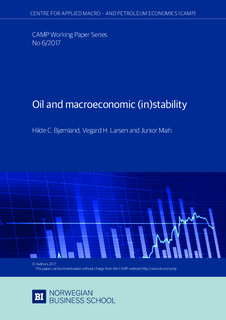| dc.contributor.author | Bjørnland, Hilde C. | |
| dc.contributor.author | Larsen, Vegard H. | |
| dc.contributor.author | Maih, Junior | |
| dc.date.accessioned | 2017-11-29T17:58:22Z | |
| dc.date.available | 2017-11-29T17:58:22Z | |
| dc.date.issued | 2017-11 | |
| dc.identifier.issn | 1892-2198 | |
| dc.identifier.uri | http://hdl.handle.net/11250/2468574 | |
| dc.description.abstract | We analyze the role of oil price volatility in reducing U.S. macroeconomic insta- bility. Using a Markov Switching Rational Expectation New-Keynesian model we revisit the timing of the Great Moderation and the sources of changes in the volatil- ity of macroeconomic variables. We find that smaller or fewer oil price shocks did not play a major role in explaining the Great Moderation. Instead oil price shocks are recurrent sources of economic fluctuations. The most important factor reducing overall variability is a decline in the volatility of structural macroeconomic shocks. A change to a more responsive (hawkish) monetary policy regime also played a role. | nb_NO |
| dc.language.iso | eng | nb_NO |
| dc.publisher | BI Norwegian Business School, Centre for applied macro- and petroleum economics | nb_NO |
| dc.relation.ispartofseries | CAMP Working Paper Series;No. 6/2017 | |
| dc.subject | Oil price | nb_NO |
| dc.subject | Great Moderation | nb_NO |
| dc.subject | New-Keynesian model | nb_NO |
| dc.subject | Markov Switching | nb_NO |
| dc.title | Oil and macroeconomic (in)stability | nb_NO |
| dc.type | Working paper | nb_NO |
| dc.source.pagenumber | 1-50 | nb_NO |
